UNIVERSITY OF NORTH CAROLINA WILMINGTON
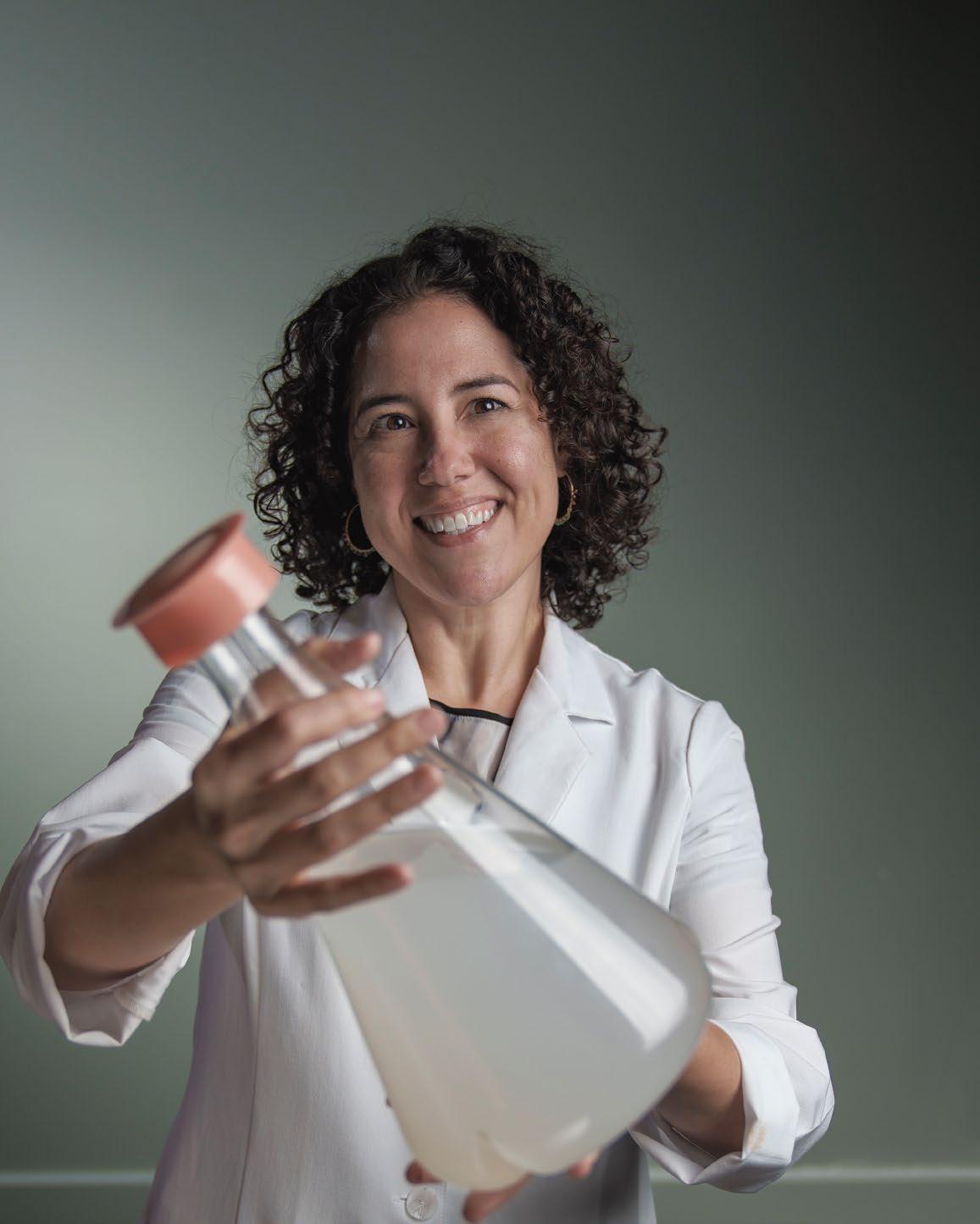
intellectual
2022
re :search a journey of
inquiry
Calcifying Microalgae Holds Promise as a Cement Alternative
to titleix@UNCW.edu. 2,750 copies of this public document were printed at a cost of $5,652.37 or $2.06 per copy (G.S. 143-170.1).
Discovering New Knowledge 2 Fighting Global Warming with Concrete 3 External Recognition 4 The Economics of Sustainable Coffee 4 Eye Size of Deep-Sea Shrimp Reveals Secrets of the Deep 4 Million Dollar Club Inductees 5 Prehistoric Bones Show Evidence of Mercury Poisoning 5 Finding New Ways to Beat Breast Cancer 6 Research Achievement Awards 7 UNCW Professors Contribute to Cameron Art Museum Exhibit 7 New Patent Recipients Solving Critical Problems 8 Neck Strength Assessment Tool Holds Promise 9 UNCW Research Innovation and Technology Portfolio 9 CIE Accelerates Entrepreneurial Ecosystem in Southeastern NC 10 Researchers Partner with Mote Marine Lab 10 Chamber Releases 2021 Economic Scorecard on ILM Region 11 Collaborative Adds Radio Tower for Tracking Wildlife 11 UNCW Joins Statewide Consortium 11 Engaging with Wilmington’s 1898 History 11 Knowledge Contributions to Enduring Impacts of COVID-19 Enhancing Student Learning 12 Interdisciplinary Initiative Opens Doors to Research, Mentorship for Diverse Students 14 Living Shoreline Conservation Partnership with Town of St. James Flourishes 15 Rocket Pitch Competition Showcases Student Entrepreneurship 15 Alumna’s Red Drum Study Reveals Link with Environmental Factors 15 New York Times Bestselling Author Jason Mott Wins National Book Award 15 Ph.D. Student’s Research Featured on the Cover of New Phytologist 16 Students Take First Place at BEA Festival of Media Arts 16 Alum Named Director of DOE Quantum Science Center 16 Two Seahawks Awarded Fellowships 17 RESEARCH REPORT: Sponsored Programs, Proposals and Awards COVER PHOTO: Catharina Alves-de-Souza seeks to fight global warming with an alternative method of cement production that utilizes calcifying microalgae (see page 2). COVER PHOTO BY JEFF JANOWSKI/UNCW UNC Wilmington is committed to and will provide equal educational and employment opportunity. Questions regarding program access may be directed to the Compliance Officer, UNCW Chancellor’s Office,
UNCW does not discriminate on the basis of sex. Questions regarding UNCW’s Title IX compliance should be directed
Produced by the Office of University Relations in collaboration with UNCW Research & Innovation Editor Jennifer Glatt ’21M Art Director Shirl New Graphic Design April Lepak Contributors Jack Bailey ’18 Caroline Cropp ’99, ’06M Susan Finley Mary Ellen Frizzell Stacie Greene Hidek Venita Jenkins Jason Streuli Tricia Vance Krissy Vick Photography Centers for Disease Control Danté Fenolio Álvaro Fernández Flores Antonio Acedo García Tina Guina/Unsplash Jeff Janowski Lifeisgood.com Bradley Pearce Alison Taylor UNCW Athletic Training Editorial Advisors Stuart Borrett Megan Kauzlaric Kirsten Wisneski
:search
910.962.3000, Fax 910.962.3483.
re
a journey of intellectual inquiry 2022
December 2022

UNCW research efforts and positive impact continue to climb. In academic year 2021-22, more than 300 faculty, staff and students served as investigators on sponsored projects. The university submitted 316 proposals requesting over $92 million in funding and was awarded 207 new projects for more than $15 million. This is a 10% increase in new awards over the previous year and the largest number of new awards in a dozen years.
These externally supported projects fuel important discoveries, contribute to local economic development and generate highquality educational opportunities. An advantage of being an active research university is that by coupling research and innovation with teaching and learning both types of endeavors are enhanced. This is a hallmark of UNCW.
This magazine features some of UNCW’s research stories and accomplishments and conveys a sense of the institution’s active discovery and innovation – from exploring microalgae’s potential to produce carbon-neutral cement to developing a neck strength assessment tool to prevent head and traumatic brain injuries. The highlights also include external support and recognition, from prestigious scholarly fellowships to a National Book Award winning alumnus. I hope you find this work as inspiring as I do.
Read on to see how UNCW is discovering new knowledge, solving critical problems and enhancing student learning through research. You will discover how our high-impact research is positively affecting the region, the state of North Carolina, the nation and the world. For example, did you know that Wilmington’s startup ecosystem ranks second among all similar-sized cities worldwide and that the flourishing biotechnology sector in Wilmington is populated by UNCW graduates? I’m excited to support the growing research enterprise at UNCW, and I cannot wait to see the continued positive impacts it produces in the future.
Stuart R. Borrett Associate Provost for Research and Innovation
The following articles highlight just a handful of the people, places, programs and partners that make UNCW an institution like no other. Join us as we lay the foundation for the university’s next great chapter, having soared past our initial $100 million campaign goal and stretch to $125 million! Visit uncw.edu/give to learn more about how you can help position the university to recruit high-ability students and top-notch faculty and immerse them in powerful learning experiences.
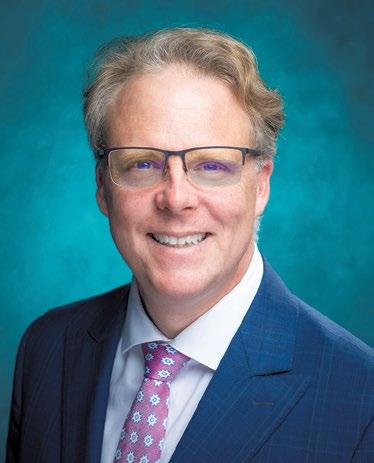
DISCOVERING
New Knowledge Fighting Global Warming with Concrete
by Venita Jenkins
Catharina Alves-de-Souza, research professor and director of UNCW’s Algal Resources Collection, is contributing her expertise to an interdisciplinary and multi-organization collaboration with the potential to make a real difference in the fight against global warming.
The project centers around investigating an alternative method of cement production that uses calcifying microalgae. This new CO2-neutral cement could be utilized in concrete structures and significantly contribute to reducing the carbon footprint of the cement industry, which accounts for 7% of the earth’s carbon dioxide originating from human activity.

“Concrete is an essential resource for climateresilient construction, but the production of one of concrete’s main ingredients, portland cement, is energy-intensive and generates a large amount of carbon in the atmosphere,” said Stuart Borrett, associate provost for research and innovation. “If successful, this research could have a positive impact on the Earth’s climate.”
According to Alves-de-Souza, the project represents one of the more innovative and exciting examples of microalgal biotechnological applications, as the approach offers a revolutionary pathway to produce, for the first time, CO2-neutral portland cement using microalgae. Nothing like this has ever been attempted before.
During traditional cement production, most of the carbon dioxide is released due to calcining (heating)
quarried limestone. This alternative method will generate cement that stores carbon dioxide by using calcifying microalgae that capture CO2 in the form of limestone plates that cover their cells. The ARC team, located at the UNCW Center for Marine Science, will screen hundreds of microalgae cultures to select those with characteristics of maximal growth and calcification. The team will also use existing knowledge on the ecology of these microalgae to optimize growth conditions and resolve the main bottleneck for the application of this technology: producing the required volumes of culture.
Alves-de-Souza is adding her expertise to a diverse research team that includes engineers, microalgal specialists, geneticists and business specialists. “Interdisciplinary collaborations can lead to truly transformative results. Due to the common use of cement as a building material, this work has the potential to scale to global proportions and make a significant impact,” said Ken Halanych, executive director of the Center for Marine Science.
The team is comprised of researchers from the University of Colorado Boulder, the National Renewable Energy Laboratory and UNCW. For this project, Alves-de-Souza has been awarded $1 million of more than a $3 million grant from the U.S. Department of Energy Advanced Research Projects Agency. The funding stems from the ARPA-E HESTIA program, which prioritizes overcoming barriers associated with carbon-storing buildings, including scarce, expensive and geographically limited building materials.
2 uncw re :search
EXTERNAL RECOGNITION
The Renaissance Society of America awarded Abigail Upshaw, assistant professor in the Department of Art and Art History, with the Pedretti Fellowship to support rising scholarly research in the field of Leonardo da Vinci studies.

Film Studies Assistant Professor Deepak Rauniyar’s “Four Nights” was among 21 short films from around the world selected to compete in the Berlin International Film Festival (Berlinale) Shorts Competition.

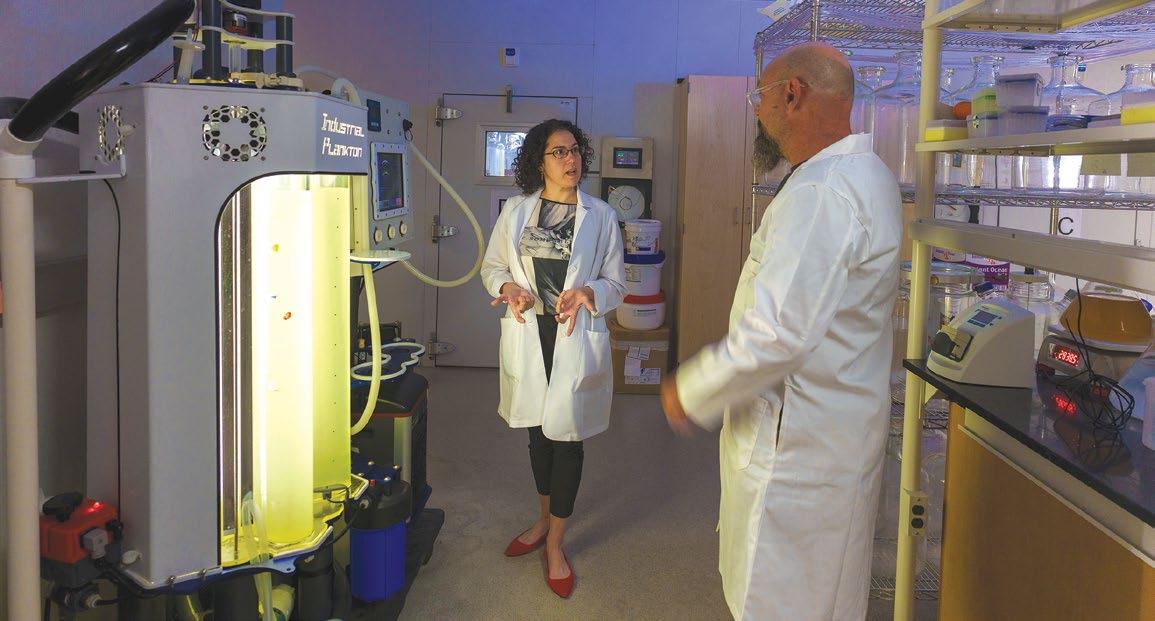
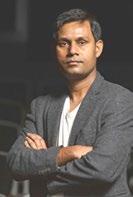


Ralph Mead, professor in the Department of Earth and Ocean Sciences, was one of four researchers awarded the inaugural North Carolina Department of Environmental Quality Applied Research Fellowship to advance the science of per- and polyfluoroalkyl substances in the state.
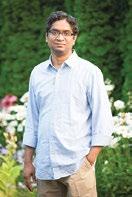
Associate Professor of History Venkat Dhulipala received a National Endowment for the Humanities Fellowship to support his book project, Between Yan’an, Pakistan, and Hindustan: Communism, Islamism, and Indian Nationalism in Hyderabad, 1935-52

From the Department of Public and International Affairs, Mark Imperial, professor and director of the Master of Public Administration program, received the 2021 Association for Public Policy Analysis and Management/Journal of Comparative Policy Analysis Award. Romeo Abraham, assistant professor in the MPA program, was named a 2022 Founders’ Fellow by the American Society of Public Administration.
Recently retired Psychology Professor Carol Pilgrim was honored with the inaugural Lifetime Achievement Award from the NC Association for Behavior Analysis.
uncw re :search 3
Upshaw Rauniyar
Mead Dhulipala Imperial Abraham Pilgrim
UNCW Research Professor Catharina Alves-de-Souza and Research Specialist Robert York discuss mass production of algal blooms in large bioreactors housed in their lab at MARBIONC.
Discovering New Knowledge
INNOVATION & DISCOVERY


The Economics of Sustainable Coffee
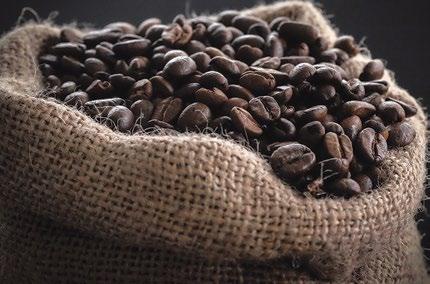
As part of the National Science Foundation’s support for convergence research, five universities and two organizations have collaborated to investigate an innovative and sustainable approach to coffee farming, called integrated open canopy cultivation, in Honduras. Cameron School of Business Professor Peter Schuhmann, with his vast experience using choice experiments as tools for determining non-market valuation, provides economic expertise to the interdisciplinary team. His contribution will highlight how a variety of factors affect adoption of sustainable practices and how coffee production characteristics affect wholesale coffee prices.
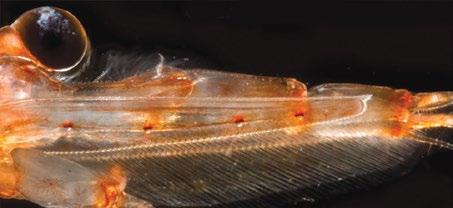

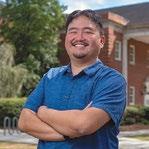

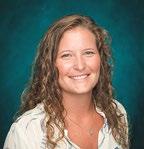


Eye Size of Deep-Sea Shrimp Reveals Secrets of the Deep
New research by Lorian Schweikert, assistant professor in the Department of Biology and Marine Biology, published in Frontiers in Ecology and Evolution, shares the discovery that deep-sea shrimp have evolved to have different eye sizes to better see the bioluminescence of their own species. The multi-institution collaboration determined that more than other ecological factors, like habitat, migration patterns, depth and even sunlight level, bioluminescence was the strongest indicator for how big the shrimp’s eyes are. This finding emphasizes the connection between vision and bioluminescence and provides more evidence that making light is, in fact, a deep-sea form of communication.
Million Dollar Club
4 uncw re :search
The James F. Merritt Million Dollar Club is a university honor and recognition for faculty and staff who have received $1 million or more in external research funding.
Patrick Carroll, Aquaculture Program
Patrick Erwin, Biology and Marine Biology
Leah Mayo, Center for Healthy Communities
Heather McWhorter, Center for Innovation and Entrepreneurship
Jeremy Morgan, Chemistry and Biochemistry
Blake Ushijima, Biology and Marine Biology
Sridhar Varadarajan, Chemistry and Biochemistry
Ron Vetter, Computer Science ($5M)
2021 Million Dollar Club inductees:
D anté Fenolio DEEPEND| RESTORE
Different species of deep-sea shrimp have evolved to have different-sized eyes to best see one another.
Prehistoric Bones Show Evidence of Mercury Poisoning
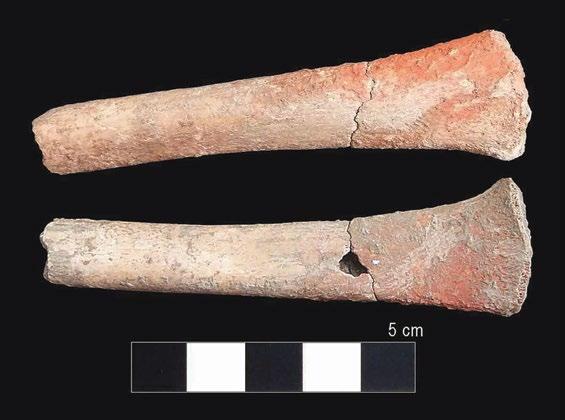


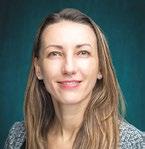





While performing routine analysis of human bones collected from an archaeological dig in Portugal, Professor of Biology Steve Emslie stumbled upon a new discovery – the earliest evidence for mercury poisoning in the history of the human population. The mercury value was more than 400 parts per milligram (ppm) in some of the bones, significantly over the World Health Organization’s recommendation of 10 ppm. Many of the bones were stained red, revealing that cinnabar, a mercury sulfide mineral found in volcanic regions, was to blame for the extremely high levels. Emslie’s collaborative research with top archeologists and physical anthropologists in Iberia (Spain and Portugal) was published in the International Journal of Osteoarchaeology and is the largest contaminant study ever done on human bone.
Finding New Ways to Beat Breast Cancer
An exciting breakthrough discovery of therapeutic treatments to help breast cancer patients experience fewer side effects is under development in the labs of Dobo Hall. Reported in the Journal of Medicinal Chemistry by Sridhar Varadarajan, professor of chemistry and biochemistry, and Arthur Frampton, associate professor of biology, this multidisciplinary research spans several years and is conducted by UNCW undergraduate and graduate students with scientist collaboration at other universities. These new molecules can selectively seek and destroy only the breast cancer cells, which will minimize patient side effects such as hair loss, gastric irritation, immune suppression and secondary cancer.
uncw re :search 5
ANTONIO ACEDO GARCÍA
ÁLVARO FERNÁNDEZ FLORES
Jennifer Fernandez-Villa, International Programs
Nathaniel Grove, Chemistry and Biochemistry
Susanna López-Legentil, Biology and Marine Biology
Narcisa Pricope, Earth and Ocean Sciences
Wendy Strangman, Chemistry and Biochemistry
Ashley Wells, Health and Applied Human Sciences
Ami Wilbur, Shellfish Research Hatchery ($5M)
2022 Million Dollar Club inductees:
Human bones recovered at prehistoric burial sites in Spain and Portugal show cinnabar stains on the surface. Historically, the mineral was traded as a valuable commodity and used in religious rituals in the Neolithic and Copper Ages.
Discovering New Knowledge
2022 Inaugural Research Achievement Awardees
The Research Achievement Awards recognize faculty for their excellence in research, innovation and scholarship leading to the advancement of knowledge in their own disciplines, discoveries with significant impact on society and the engagement of students in the process.
Rising Research Excellence Award
April Braswell, Associate Professor, School of Nursing
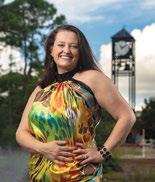
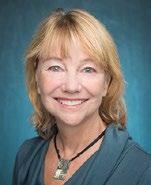

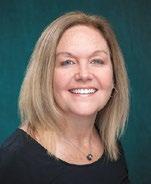

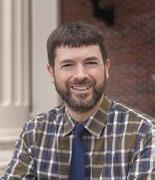
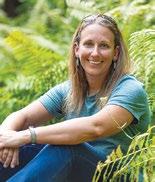

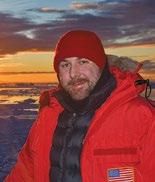
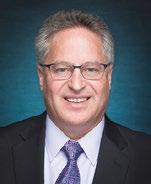
Xaver Neumeyer, Assistant Professor, Department of Management
Richard Pond, Professor, Department of Psychology
Michael Tift, Assistant Professor, Department of Biology and Marine Biology
Rachael Urbanek, Professor, Department of Environmental Sciences
Kristen DeVall, Professor, Department of Sociology and Criminology
Christina Lanier, Professor, Department of Sociology and Criminology
Sally MacKain, Professor, Department of Psychology
Jeanne Persuit, Professor, Department of Communication Studies
Ron Vetter, Professor, Department of Computer Science
6 uncw re :search
Research Collaboration Award: National Drug Court Resource Center
Braswell
Neumeyer
Pond
Tift Urbanek
DeVall
Lanier
MacKain
Persuit
Vetter
“Confluence,” a multi-sensory art and science experience from The Algae Society Bio Art & Design Lab, ran at the Cameron Art Museum from January 28 through April 24, 2022. The exhibit explored historical and modern ways to view the study of algae through portraits, interactive projections and videos. The exhibition team included contributing artist Gene Felice, assistant professor of digital art and co-founder of The Algae Society, and contributing scientists Catharina Alves-de-Souza, research professor and director of the Algal Resources Collection, and Alison Taylor, professor in biology and marine biology

New Patent Recipients
Patents protect novel and practical inventions such as products, designs or processes. The patent grants exclusive rights to the inventor, preventing others from copying, selling or using the protected invention without legal permission.
Human Waste Water and Human-Derived Pathogen Scouting Tool


uncw re :search 7
UNCW Professors Contribute to Cameron Art Museum Exhibit
and director of RMD Bioimaging Facility.
Lawrence Cahoon, Biology and Marine Biology
Mary Turbe ’17, Environmental Sciences
Pine resin colored with spirulina are embedded with seaweed for people to play with on a whiteboard in “Confluence.”
SOLVING Critical Problems Neck Strength Assessment Tool Holds Promise
 by Jack Bailey ’18
by Jack Bailey ’18
Concussions, which are caused by an impact that moves the brain within the skull, can lead to problems with thinking, concentration, mood or other neurological changes. A neck that is stronger, thicker or aligned in a neutral posture – with the ears aligned with the shoulders – may reduce the amount of energy transferred to the brain during an impact, reducing the risk and severity of injury.
Strong necks are one way to prevent head and traumatic brain injuries, and the School of Health and Applied Human Sciences’ Alex McDaniel, assistant professor of exercise science, and Lindsey Schroeder, associate professor of athletic training, have invented a device to measure this strength.
McDaniel and Schroeder began researching mild traumatic brain injury in athletics in 2017. McDaniel noticed that researchers were studying ways to improve neck strength to ward off potential traumatic brain injuries in athletes, but no one was focusing on the same issue in the military. Between 2000 and 2019, there were 416,000 traumatic brain injuries in the military; 82% of those were mild.
“In the 82nd Airborne, the number one cause of decreased military readiness is brain trauma from parachute landings. We saw an opportunity,” McDaniel said.
Military paratroopers are especially vulnerable to the recurrence of concussions. They can land at a rate of 15 to 20 miles an hour while carrying 100150 pounds of gear.
“Even small, repetitive blows impact the brain, so every time they launch their parachute adds up over time. Other landings can be quite impactful and concussions are immediate,” Schroeder said. Lab research has shown that neck strength can reduce head acceleration following impact, suggesting that neck strengthening exercises may be a concussion prevention strategy.
McDaniel and Schroeder were awarded a $110,000 Translational Research Grant from the North Carolina Biotechnology Center to develop an enhanced prototype of their patented neck strength assessment tool, rigorously test it and work towards approval from the Food and Drug Administration as a medical device. The grant was awarded in collaboration with Justin Streuli from the Office of Innovation and Commercialization, Bill Kawczynski from the Office of Military Affairs and multiple community partners.
8 uncw re :search
COMMERCIALIZATION, ENTREPRENEURSHIP AND ECONOMIC DEVELOPMENT
UNCW Research Innovation and Technology Portfolio
UNCW has a strong portfolio of diverse research innovations, both existing and in development, that is impacting society by solving critical problems.
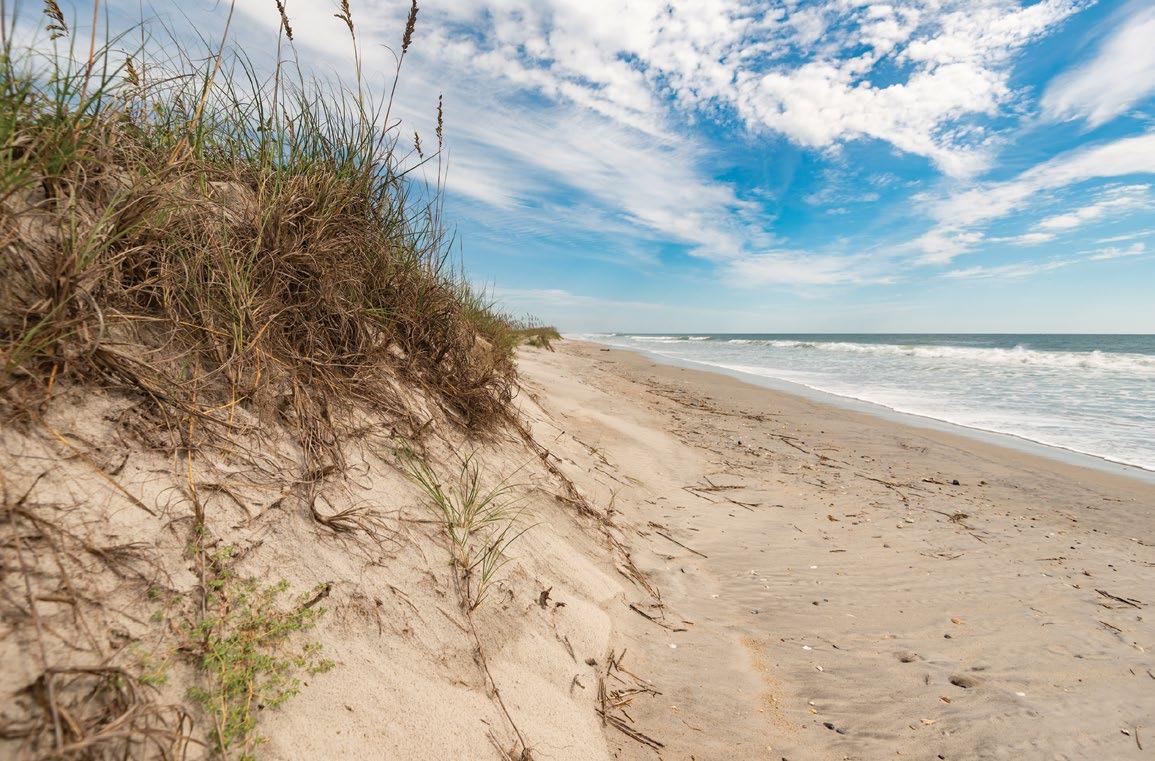

The MORPH Longitudinal Database developed by the Institute for Interdisciplinary Identity Sciences (I3S) is the largest longitudinal facial recognition database in the world and recently doubled in size. MORPH contains 400,000+ images of nearly 70,000 subjects, taken over time, and includes metadata for age, gender, race, height, weight and eye coordinates.
Beyond intellectual property, UNCW has an assortment of products available for sale. These include oyster seed from the Shellfish Research Hatchery, black sea bass from the Finfish Aquaculture Facility, cultures from the Algal Research Collection and ELISA test kits for the harmful toxins these algae produce.
The university also has several new and exciting innovations underway. Researchers are developing a method to keep mRNA therapeutics stable at room temperature for extended periods of time; investigating how to inhibit the growth of bacteria, fungus and other microbial life that infect millions of people every year; creating technology to better assess emotional health; producing more effective cannabinoid compounds; and building marine sensors – one to track CO2 and another to report real-time environmental change during extreme weather events.
CIE Accelerates Entrepreneurial Ecosystem in Southeastern NC
The Center for Innovation and Entrepreneurship launched the Alliance for the Blue Economy, a multidisciplinary initiative to establish southeastern North Carolina as a national and global leader in the Blue Economy. The group debuted at “All Blue Week” with more than a dozen events explaining and exploring its goals – to support local entrepreneurs and innovators, promote the region as an innovation hub, assist in the creation of infrastructure and attract investment capital in the Blue Economy.
The CIE also co-sponsored the Coastal Entrepreneur Awards with the Greater Wilmington Business Journal. The event celebrated 11 standout startup companies and nonprofits, of which several recipients are alumni of UNCW or have ties to the university and the CIE. A common thread across the flourishing biotechnology sector in Wilmington is the presence of UNCW graduates. Wilmington’s entrepreneurial ecosystem is vibrant and growing, and critical to the success and economic development of the region.
uncw re :search 9
SOCIAL AND LOCAL IMPACT
Researchers Partner with Mote Marine Lab to Ensure Accurate Toxin
Testing
Jennifer McCall, assistant professor in the Clinical Research Program in the School of Nursing, and Susan Niven, research specialist at the Center for Marine Science, are collaborating with Mote Marine Laboratory, in partnership with FWC Fish and Wildlife Research Institute, to provide better real-time information to shellfish farmers during harmful algal blooms (HABs) of Florida Red Tide. McCall’s lab at CMS is one of the only labs in the world that can provide the suite of toxins needed to ensure accurate field testing of Mote’s on-the-boat toxin test kits. Their work also prepares and protects North Carolina as HABs become a greater possibility in our region.
Chamber Releases 2021 Economic Scorecard on ILM Region
The Regional Economic Development Scorecard was created in 2015 by the Wilmington Chamber’s flagship initiative, Cape Fear Future, to provide a baseline to develop goals that will encourage economic progress. The scorecard is an objective depiction of where our region stands against peer cities, and this fifth edition contains data from key areas of economic development: human capital, innovation, entrepreneurship, quality of place and traded sector. The research, conducted by Professor of Economics Adam Jones and the UNCW Swain Center for Executive Education and Economic Development, reflects data collected from Brunswick, New Hanover and Pender counties. The key takeaway is that the region has consistently maintained a slight edge, and the community is incrementally growing, which makes a big difference over a long period of time.

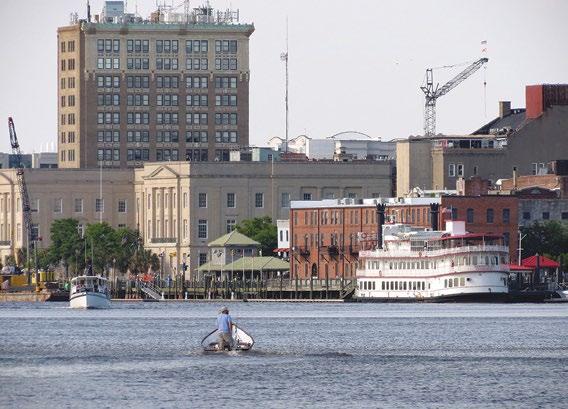
10 uncw re :search
Collaborative Adds Radio Tower for Tracking Wildlife
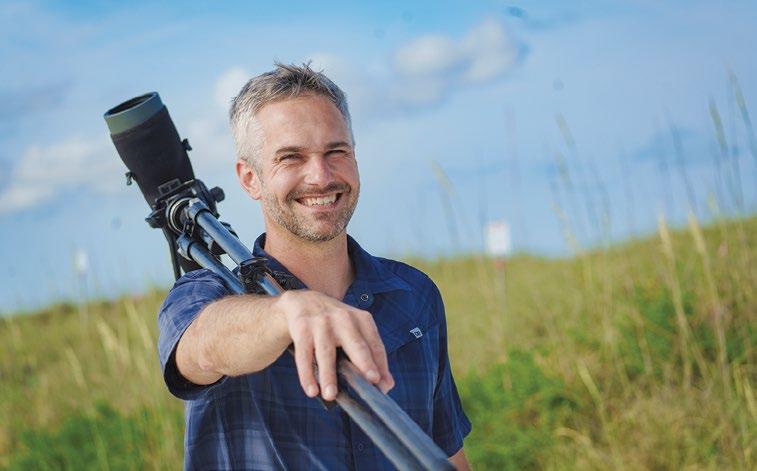
Previously, only a small number of automated
North
Thanks
UNCW Joins Statewide Consortium to Develop Human Performance Technologies and Services for Nation’s Military
UNCW, in collaboration with more than 25 North Carolina-based academic, industry, nonprofit and state government organizations, has joined the North Carolina Center for Optimizing Military Performance, a new consortium tasked with developing world-class human performance solutions for the nation’s military. NC-COMP will focus on interdisciplinary and holistic research and development to address three main areas: preventing injury and speeding recovery, maintaining performance in multi-stressor environments and enhancing baseline physical and mental performance for service members. Karl Ricanek, professor of computer science and director of the Institute for Interdisciplinary Identity Sciences, serves as UNCW’s liaison to NC-COMP.
Engaging with Wilmington’s 1898 History
As part of continued scholarship around teaching 1898, Watson College of Education faculty members Cara Ward, Donyell Roseboro and Denise Ousley-Exum have investigated using a history lab and children’s literature with grades 4 through 8 and interdisciplinary place-based experiential learning with grades 9 through 12. Results have been published in the NJCSS journal Teaching Social Studies, by the Taylor & Francis Group in the journal Whiteness and Education, and presented at the 4th Annual Teaching Black History Conference.
The Teagle Foundation has funded UNCW to develop the Fragility, Resilience and Engaged Education in Democracy (FREED) Project, a university-wide program to enhance civic education through the integration of coursework, applied learning and community-engaged research and learning. Students will explore what it means to participate in a democracy, how that participation is activated through civic engagement and how fragile that participation may be under certain circumstances. The project will focus on Wilmington’s history, including the 1898 coup d’état and massacre.
Knowledge Contributions to Enduring Impacts of COVID-19
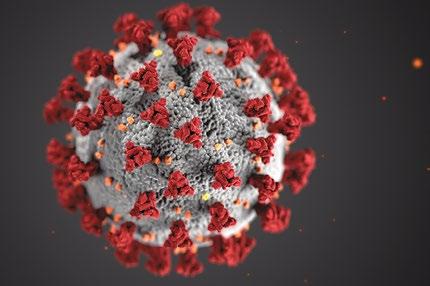
uncw re :search 11
Chris Prentice, professor of public and international affairs, co-developed spatio-temporal mapping for estimating real-time characteristics of the coronavirus in the U.S. The statistical model was used to create several visualization dashboards for both fellow researchers and policymakers in the region. Findings about the effectiveness of state-issued, stay-at-home orders were co-published in Scientific Reports Sabrina Cherry, associate professor of public health in the School of Health and Applied Human Sciences, is featured in Vaccination from the Misinformation Virus. The documentary aims to help address vaccine concerns by explaining why vaccines are safe, crucial to community health and save millions of lives.
radio tracking towers tied into the Motus Wildlife Tracking System existed in
Carolina.
to a partnership between Cape Fear Audubon Society, Audubon North Carolina and the lab of Biology Assistant Professor Raymond Danner, a new Motus tower was installed on Lea Island south of Topsail. The towers assist with tracking migration and conservation efforts by uploading real-time data when a tagged bird flies nearby.
ENHANCING Student Learning
Interdisciplinary Initiative Opens Doors to Research, Mentorship for Diverse Students

In 2019, six UNCW faculty members teamed up to encourage research by diverse groups of students, including racial and ethnic minorities; people with mental, physical or sensory disabilities; LGBTQIA+; military veterans; and first-generation college students.
The Interdisciplinary Minority Student Research Group combines interdisciplinary collaboration, studentengaged research and mentorship, which is important to help students reach their academic potential. Team members use the initiative to introduce their classes to more inclusive curriculum and research topics, as well as increase diversity in internship opportunities.
“The research opportunities we have provided IMSRG mentees over the past three years involved important experiential and applied learning experiences that ultimately led to higher academic and professional success,” said Josalin Hunter, IMSRG director. “Our students are soaring in various fields, earning awards, successfully moving through grad school, engaging dynamic community change and just being overall rockstars. I like to think that IMSRG provided mentorship that helped to foster the confidence, support and skills that uplift and illuminate the abilities these students already have.”
by
IMSRG began as a three-year initiative funded through the Office of Community Engagement and Applied Learning. The program is currently supported by the UNCW Equity Initiative housed in the Office of Community Engagement and Impact. IMSRG is seeking additional funding to support more mentoring opportunities, resources for students and professional development, said Hunter.
This year, 10 IMSRG mentees are working with faculty across various disciplines, including Josalin Hunter, assistant professor of social work; Kris Hohn, assistant professor of social work; Anka Roberto, assistant professor of nursing; and Addie Sayers, assistant professor of English. Affiliate faculty mentors are Alicia Sellon, assistant professor of social work; Kim Cook, professor of sociology; and Maia Butler, associate professor of English.
12 uncw re :search
Venita Jenkins and Tricia Vance
By the end of year three, the goal was to move from a mentor-led research model to a student-led, facultyadvised initiative that also engaged the greater Wilmington community and advanced research involving diverse communities. The program shifted to respond to mentor-mentee needs, said Hunter, due to impacts from the pandemic.
“We have not yet developed a fully student-led model,” she added. “We have developed IMSRG's CAIT model, inspired by data and feedback from prior IMSRG mentees, which facilitates ‘Critical, Adaptive, Interdisciplinary, and Trauma-Informed’ mentoring – an evidenced need for the minoritized students we work alongside.”

Natalie Loschiavo is among the students who have benefited from the support of their faculty mentors and their peers. Loschiavo is pursuing her Doctor of Nursing Practice–Psychiatric Mental Health Nurse Practitioner degree, with plans to work with underserved youth who have experienced trauma.
“The opportunity to conduct meaningful research is a unique and rewarding experience that I did not expect to have this early in my coursework,” she said. “The idea that I am able to take part in something that will benefit youth and their mentors, promote better care for at-risk children and likely offer improved long-term outcomes is fulfilling and exciting.”
Loschiavo worked with her faculty mentors Roberto and Hunter in the research for the Life Is Good Playmakers program, which utilizes the power of optimism to build resilience to Adverse Childhood Experiences such as various forms of abuse, neglect and household dysfunction. The program aims to provide support and encourage optimism and resilience for both children and their mentors.
“I have been fortunate to have this experience,” Loschiavo said. “The knowledge and support that I have been offered is invaluable and has increased my capabilities as a nurse and researcher.”

uncw re :search 13
“IMSRG helped foster the confidence, support and skills that uplift and illuminate the abilities these students already have.”
– Josalin Hunter, IMSRG director
Enhancing Student Learning
Living Shoreline Conservation Partnership with Town of St. James Flourishes

The Town of St. James’ Living Shoreline Student Support Fund Endowment furthers existing research, education and outreach in and around the town by providing students hands-on opportunities in estuarine ecology, biology, restoration ecology, conservation and marine education. The work, including oyster reef establishment, living shoreline research and coastal science, informs sustainability efforts along the North Carolina coast and beyond. As the state’s coastal university, coastal resiliency is a core component of student and faculty research.

14 uncw re :search
UNCW students and staff work alongside Town of St. James residents to build up the oyster reefs and Spartina grass to stabilize the Intracoastal Waterway shoreline.
Rocket Pitch Competition Showcases Student Entrepreneurship
Sponsored by the Cameron School of Business with support from the Small Business and Technology Development Center and the Center for Innovation and Entrepreneurship, the annual Rocket Pitch Competition provides undergraduate and graduate students from all majors with an opportunity to share their ideas for new companies or products. James Plott ’21 won first place in the 2021 competition for his idea to start a glamorous camping business using glass-domed tents. Plott was among 34 student applicants and 11 finalists who pitched their entrepreneurial ideas to a panel of nine judges.
Alumna’s Red Drum Study Reveals Link with Environmental Factors
Danielle Goldberg ’20M, with Professor Fredrick Scharf of the Department of Biology and Marine Biology, examined how environmental factors impact red drum – North Carolina’s state fish – recruitment. This novel study found that wind plays an important role in transporting larval-stage red drum to nearshore areas and that higher nearshore temperatures early in the spawning season occurred during years with high recruitment. This information can assist forecasting by red drum fishery managers and can be used to improve future red drum management.
Ph.D. Student’s Research Featured on the Cover of New Phytologist
New York Times Bestselling Author Jason Mott Wins National Book Award
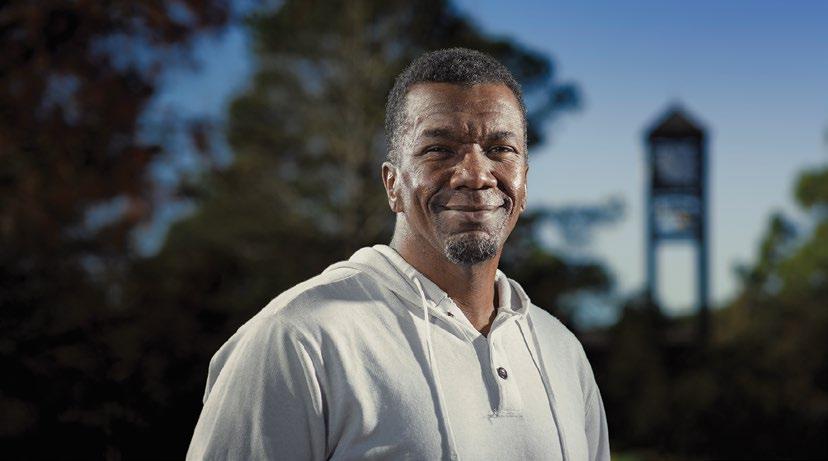
Jason Mott ’06, ’08M won the National Book Award in the category of fiction for his newest novel. The critically acclaimed Hell of a Book explores the injustice and fear of growing up Black in the American South. It was named winner of the 2021 Sir Walter Raleigh Award for Fiction, the 2021 Joyce Carol Oates Prize, the 2021 Aspen Words Literary Prize and longlisted for the 2022 Carnegie Medal for Fiction. It made the Entertainment Weekly “Must List,” the NY Post’s “Best Summer Reading Books,” USA Today’s “5 Books Not to Miss” and was chosen by the TODAY Show’s Jenna Bush Hager as a “Read with Jenna” pick. Mott is a former writer-in-residence in the Department of Creative Writing.
Professor Alison Taylor and Erin Meyer ’16, ’22 Ph.D., both of the Department of Biology and Marine Biology, had their work on mechanisms of coccolithophore and the role of silicon featured on the front cover of New Phytologist
The paper, co-published with several international collaborators, settles a long-standing question of the cellular origin of haploid coccoliths.
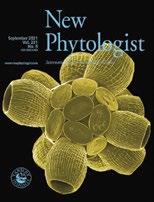
uncw re :search 15
Enhancing Student Learning
Students Take First Place at BEA Festival of Media Arts
The Broadcast Education Association annually hosts a competition for faculty and students from around the world. “Digital Drip,” a performance-based show produced by UNCW undergraduate students in COM 482: Studio Video Production II, received first place honors in the Student Video and Film Competition Studio category. The 2022 award-winning student team – Abby Winstead ’21, Savannah Prince ’21 and Matthew Stott ’21 – were selected for an April 2021 episode featuring musician MoeSOS DC.
Alum Named Director of the Quantum Science Center at DOE

Travis Humble ’98 has been named director of the Quantum Science Center, headquartered at the Department of Energy’s Oak Ridge National Laboratory in Tennessee. The QSC is a multi-institutional partnership that spans industry, academia and government institutions and is tasked with uncovering the full potential of quantum materials, sensors and algorithms.

Two Seahawks Awarded Fellowships
North Carolina Space Grant and North Carolina Sea Grant named Allie Best ’23M, current UNCW graduate student, and Nicholas Corak ’11 as Graduate Research Fellows. This fellowship provides support for graduate students researching high-priority needs within North Carolina watersheds, coastal areas and nearshore environments. Their research projects will utilize data from NASA and NOAA’s vast archives, as well as the agencies’ remote-sensing data from airplanes, unmanned aerial vehicles, unpiloted submersibles or other technologies.
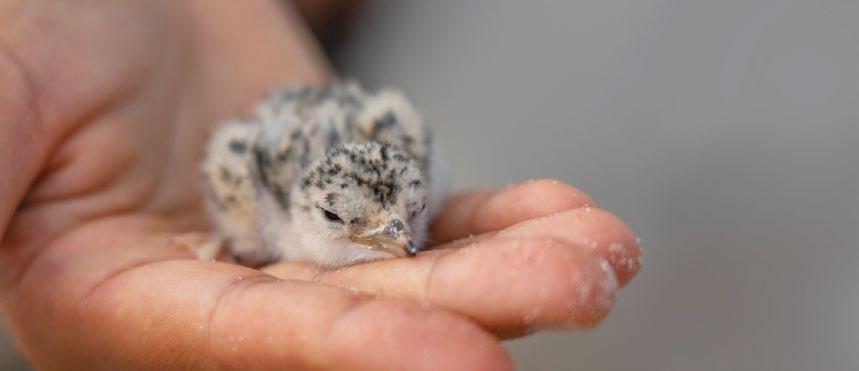
Learn more about how UNCW students are conducting frontline conservation research at uncw.edu/capehatteras
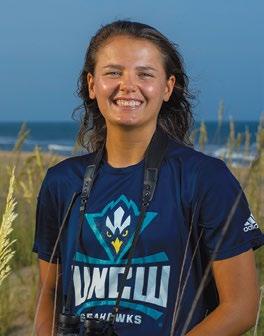
16 uncw re :search
Best
Corak
uncw re :search 17 Awards Total Awarded Count $15 $10 $5 $0 300 200 100 0 Millions 195 $9.5 2016 160 $11.4 2017 220 $9.4 2018 184 $12.0 2019 190 $8.8 2020 209 $13.7 2021 205 $15.1 2022 Top Five Federal Prime Sponsor NC State Prime Sponsor 1 2 3 4 5 National Science Foundation (NSF) DOC National Oceanic and Atmospheric Administration (NOAA) U.S. Small Business Administration (SBA) U.S. Department of Justice (DOJ) U.S. Department of Defense (DOD) North Carolina State Appropriation North Carolina Policy Collaboratory North Carolina Department of Environment and Natural Resources (NCDENR) NCDENR Department of Environmental Quality (DEQ) NCDHHS Division of Health Benefits (DHB) Proposals Total Requested Count $100 $50 $0 400 300 200 100 0 Millions 266 $47.2 2016 281 $57.3 2017 253 $40.0 2018 288 $65.1 2019 292 $77.1 2020 318 $87.2 2021 302 $92.2 2022 Federal $ 8,045,681 52.6 % State Government (NC) $
15.8 % Foundation $
10.1 % Nonprofit Organization $
9.1 % Business and Industry $ 790,872 5.2 % State Government (non-NC) $ 460,473 3.0 % Local Government $ 322,537 2.1 % Educational and Research Institutions $ 282,416 1.8 % Federal (non-US) $ 56,742 0.4 % Total $ 15,309,495 Prime Sponsor Type Funding Received Percent Members $10 Million Club 15 $5 Million Club* * 19 $1 Million Club* 108 * *1 New Inductee * 7 New Inductees Innovation and Commercialization Disclosures 11 Patents Filed 2 Commercial Licenses 4 Academic Licenses 30 SPONSORED PROGRAMS, PROPOSALS AND AWARDS RESEARCHREPORT Fiscal Year 2022
2,412,649
1,546,303
1,391,822
U.S. Postage P A I D Wilmington, NC Permit No. 444
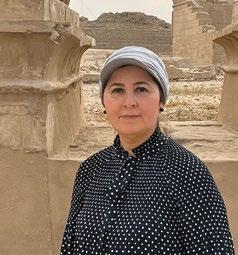
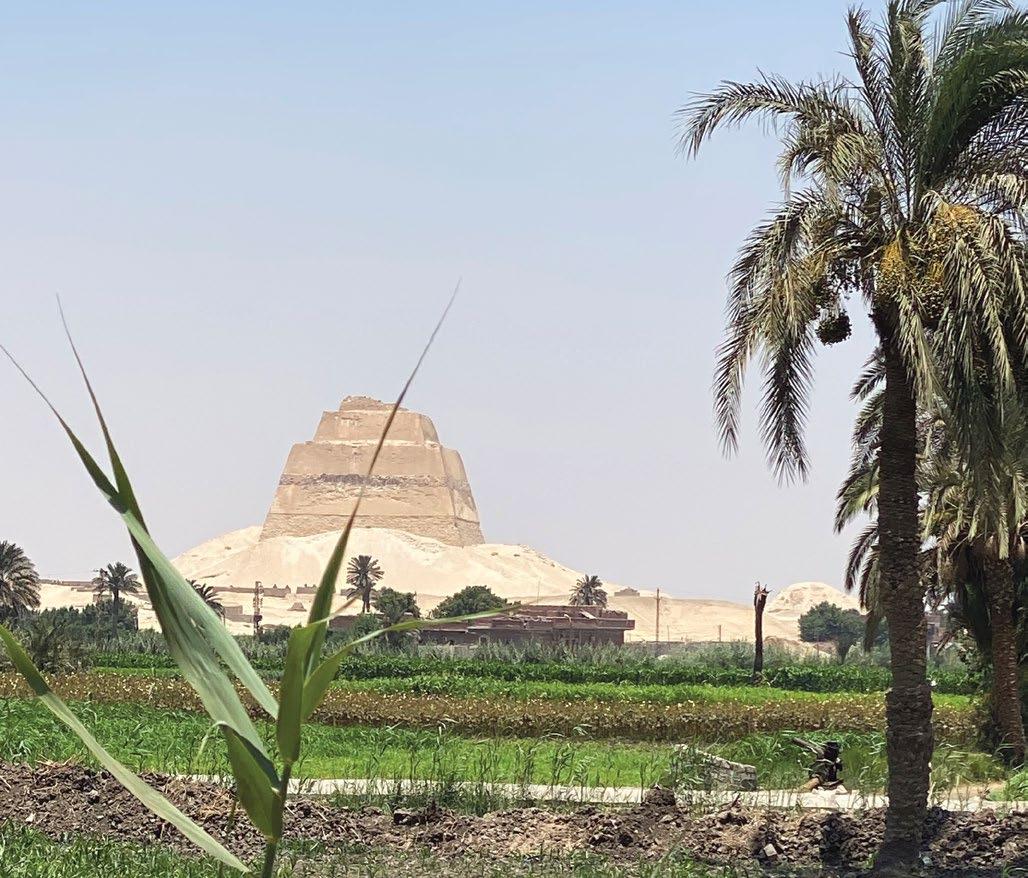

Nonprofit
Organization
601 South College Road Wilmington, NC 28403-5904
1947 2022
Professor Eman Ghoneim Awarded NSF Grant to Unearth Ancient Egyptian Settlements













































 by Jack Bailey ’18
by Jack Bailey ’18
























